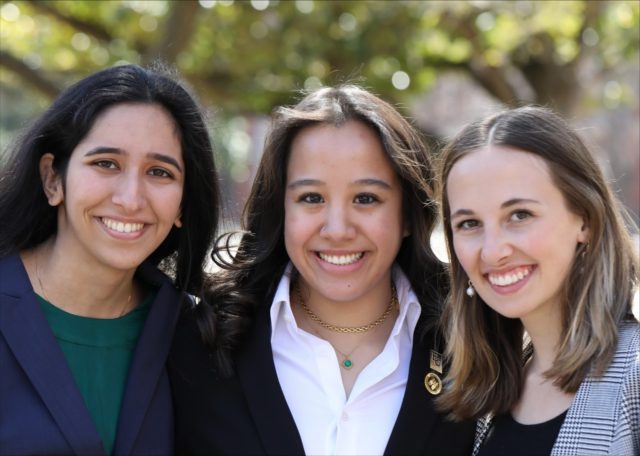By Matt Kyle | Staff Writer
The Truman Scholarship is a competitive scholarship given by the Truman Foundation to college juniors whom the foundation identifies as leaders. Students must have a strong record of public service and intend to pursue a career in public service. According to the foundation’s website, hundreds of college juniors apply for the scholarship each year.
Last month, 189 students were named as finalists for the scholarship, with three finalists coming from Baylor. Baylor was one of only a few schools, behind Stanford, Harvard, Montana and Duke, to have three finalists. There were 129 institutions represented in finalists.
The three finalists are Shreveport, La., junior Veronica Penales; Littleton, Colo., junior Eliana Stromberg; and Houston junior Isha Thapar. While the application process was long and difficult, the three finalists said the scholarship would help them in their goals of making change both nationwide and in their local communities.
Penales said the process of applying for the Truman Scholarship was the hardest thing she has ever done. She said she wrote 54 drafts of her application.
In addition to writing 14 short essay questions, obtaining multiple letters of recommendation and an endorsement from Baylor and going through an interview process, applicants needed to write a formal policy proposal on a current legislative issue.
“My policy proposal is about LGBTQ rights in the workplace,” Penales said. “So I had to touch up on all the Supreme Court cases that address that, Title VII, Title IX, just a lot of precedents. And knowing what you’re going to be asked — I think I prepped 108 Supreme Court cases the night before.”
Stromberg said she became interested in service due to her desire to have a legacy that is bigger than herself and to help the generations that come after her. Last semester, she was an intern for the U.S. Department of Justice in the Environment and Natural Resources Division. During her junior year of high school, Stromberg said she spent time with indigenous tribes in the Peruvian Amazon and saw firsthand how environmental injustice affected them.
“The president in Peru had cut some corners when commissioning a new sewage plant to be built in the upstream city called Iquitos,” Stromberg said. “So basically, human waste was flowing into the rivers that they depended on and that they swim in every day, so they were chronically sick. It really upset me because I had developed a relationship with these kids. I’ve been on the unwavering path ever since.”
Thapar said she wants to pursue a M.D./J.D., which is a joint program allowing for students to study both medicine and law. She said one of her long-term goals is to serve as an adviser to legislators on environmental policy.
“Issues like environmental health disproportionately impact low-income, minority, marginalized populations,” Thapar said. “To have the opportunity to advocate for these groups who aren’t seen as well represented in our political system, that to me is a great opportunity and something that can make a lasting difference.”
Penales said she hopes to go to law school to continue the work she has done with her internships, as well as to join a legal counsel for a nonprofit like the American Civil Liberties Union to continue working on policy change.
Penales has a history of activism at Baylor. Last school year, she co-authored the “No Crying On Sundays” bill in support of chartering Gamma Alpha Upsilon while she was a student senator, and she was part of a lawsuit against the U.S. Department of Education for giving Title IX exemptions to religious universities.
“You get a special feeling when you’re fighting for a cause bigger than yourself,” Penales said. “Everyone is giving you all these challenges and obstacles that you have to face in order to push for these causes to be successful. The goal that you’re fighting for affects so much more than you and is for the betterment of institutions that you care about. A lot of people have asked me why I do the work I do at Baylor and why don’t I just transfer. It’s because I love Baylor enough to want to see it change.”
After they learned they had been named finalists, the students said they felt happy and relieved but also felt the pressure as they await the final decision on who would be named a recipient of the scholarship. Winners of the $30,000 scholarship won’t be announced until the week of April 4.
“It’s not over until the fat lady sings,” Stromberg said. “Now we’re in a waiting game. But no matter what happens, I’m really thankful to be at this stage and to have had this experience.”



